by Dr. Summia Naz (BSc PhD)
Disclaimer: This information Including but not limited to text, graphics, and images in the blog is for information purposes only. Do not substitute this information for medical advice, diagnosis, or treatment. Do not copy or partially copy without referencing. The division of this article is based on Ibn Al Qayyam’s health model but Some views are held by the author – please refer to his book to gain further wisdom within.
In a world where medicine, research, literature, knowledge, and advanced science are widely available, poor mental health, obesity, and chronic conditions are perplexing. Preventative medicine requires a deeper understanding of clinical manifestations, understanding the temperament of different individuals, social environment, lifestyle, diet, nutrition, and family. In addition, moral decline, fulfilling lusts and desires and environmental toxins have also contributed to an imbalance in the human body, and whilst medicine has progressed, chronic conditions have increased.
There are numerous Islamic texts that support how humans can maintain good health. This has also been highlighted in the research I have carried out. Our body is an Amanah (trust) given to us by Allah the Almighty. Imam Ibn Qayyim Al-Jauziyah highlighted three basic principles of medicine: prevention, maintenance, and removal.
Prevention
Preventative medicine includes the protection against psychological, physical, and infectious diseases. The Islamic faith is all-encompassing, it covers all aspects of life through the Quran and Sunnah. It is incumbent on all of us to seek authentic knowledge and implement it.
Preventative Medicine Related to Food
Preventative medicine is eating tayyib (clean food that is good for you and is suited to your body type). Removing harmful foods and harm associated with your environment and then maintaining those changes.
Overeating
It is advocated in Islam to not eat excessively. Al Musnad (by Imam Ahmad) narrated that the Prophet Muhammad (PBUH) said:
“The son of Adam never fills a vessel worse than his stomach. The son of Adam only needs a few bites that would sustain him, but if he insists, one third should be reserved for his food, another third for his drink, and the last third for his breathing”
Overeating and consuming more than the body needs can harm the body and change its functions. Eating in moderation and a diet that is suited to your temperament is ideal with a focus on nutrient-dense foods. The Prophet PBUH told us that one only needs a few bites to sustain him so that his strength does not fail him. When the stomach is full of food there will not be enough space for drinking. If you do drink, it will cause breathing to be difficult and lead to fatigue and laziness. If you occasionally eat to your fill, there will be no harm. However, if you regularly eat to your fill it affects the body and the heart and can lead to multiple clinical manifestations.
The body relies on food and drink for its survival. Not all food and nourishment is digested when consumed. These substances accumulate in various qualities and quantities and this accumulation can harm the body and cause clogs in different parts of the body. If you extract these clogs with medicine the body is harmed more because most of these medications extract beneficial substances along with the harmful ones. (See your health care provider if you are concerned or contact dr.naz.therapy@gmail.com). One should avoid overeating, in some cases moving about is one of the best methods to deny these substances the chance to accumulate. Moving heats the organs and dissipates the leftover substances the chance to accumulate. The body will get used to being energetic and light through physical activity and would optimize the intake of food, firm up the joints, strengthen the muscles and the ligaments (Imam ibn Qayyim Al -Jauziyah, 2003).
Types Of Diet
It is firstly important to understand that all humans have different temperaments. As we get older our temperament can change, this is dependent on nutrition, lifestyle, and environmental exposure to different substances. In addition, deficiencies, chronic conditions, and weaknesses in the body can create a plethora of symptoms in different individuals.
There is no perfect diet. Everyone has different temperaments. Please see below for real-life client cases. Through therapy programs I offer online, case studies proved one type of diet does not suit all. Programs can include nutrition, counselling, life coaching, career coaching, family therapy, etc. I will keep the cases short and to the point. The below information was not noticed straight away. They were monitored.
Case 1: too much veg/greens caused headaches because of oxalates. Tayyib/clean carbs and a moderate amount of veg and protein were suited to the client.
Case 2: controlling diabetes naturally, carbs and fruit affected this client’s blood sugar. Her blood sugar was controlled through veg and meat.
Case 3: removed all non-tayyib food, diabetic man. Too much meat/chicken caused constipation and stomach issues. He was suited to rice, fresh bread, vegetables, soups.
Case 4: Heavily pregnant woman. Vegetarian most of her life. Needed a meat source to rectify her mood, irritability, and fatigue (deficiencies). It is important to note heme iron is readily absorbed compared to nonheme iron in vegetables.
Case 5: ate SUPER healthy but stressed and sick. Root cause and manifestations needed to be looked at. Due to stress, her temperament changed and she could not digest even healthy food. Once therapy started her allergies and poor gut health resolved.
Case 6: severe intolerances (all tests inconclusive), insomnia, and pain. Eventually concluded she was suited to veg and lots of fruit. Even fish and lentils affected her. Through a tailored program, foods that caused adverse effects were eliminated, through health coaching, the sleep and pain improved.
Fasting
Preventative medicine and maintaining your spiritual health are also linked to fasting. According to my research, fasting the 2 sunnah days (Monday and Thursday) is preferred, and if one wants to also do intermittent fasting that is ok too. The superiority of Islamic knowledge and medicine primarily emphasizes your connection with Allah the Almighty. Pleasing your Lord and the One who created you. He wants good for you and therefore the intention and motivation behind fasting creates a “happy feeling” which will release endorphins (the body’s natural painkillers) too.
Please note that teenagers must be assessed if they want to do intermittent fasting as many have used this to control their weight in an unhealthy manner causing deficiencies. The sole purpose of fasting must not be to lose weight. With sunnah fasting, the intention should be for the sake of Allah alone.
Fasting is a shield from many illnesses of the heart, soul, and body. The body rids itself of harmful substances, promotes healthy cell regeneration, allows the body and digestive system to rest and regulate. It protects us against immune system damage, induces immune system regeneration, and shifts stem cells from a dormant state to a state of self-renewal. As people age, their intestinal stem cells lose the ability to regenerate which can reduce the ability to recover from gastrointestinal infections and other conditions that affect the intestine. In addition, fasting promotes a reduction in inflammatory cytokines and improved immunity. Islam came to all humans and when fasting is adopted from a spiritual angle and for physical remedies, the heart, body, and soul will benefit. Allah the Almighty said:
“O you who believe! Observing As-Saum (the fasting) is prescribed for you as it was prescribed for those before you, that you may become Al-Muttaqun (the pious)” [2:183]
(Imam Ibn Qayyim Al-Jauziyah, pg291, 2003)
Fasting helps you to draw closer to Allah the Almighty. It facilitates striving for Ihsan (righteousness and sincerity), helps in the refinement of good character, and increases patience and strength. Further Benefits of fasting include:

Remedies and Prevention When You Feel Sick
In regards to the body, remedies should be used when needed. Superior prevention is to spend time and energy curing the ills of the heart and soul, preserving health, and preventing any harm that may touch you. Curing the ills of the body without curing the heart does not yield strong results. (Imam Ibn Qayyim Al-Jauziyah, pg35, 2003)
Simple Preventative Steps before a Cold, Flu, or Virus gets worse
1. Dua
2. Authentic Ruqya (see Ustatdh Tim Humble’s advice)
3. Honey water (beneficial honey includes manuka, sidr, or any organic honey)
4. Qust al hind (must be used wisely, not suitable for pregnancy)
5. Cotton compress soaked in room-temperature water.
6. Soups/broth
7. Remove refined foods (as discussed in the removal section)
8. Don’t drink milk as this can increase mucous (modern-day milk is not like olden-day milk)
9. Cupping as preventative medicine
10. Blackseed oil in moderation and only when you are sick (not suitable for pregnancy)
Honey
Ointment
Reduces phlegm
Cleanses the liver in moderation
Potent cleanser when mixed with water for treating diarrhea (expels the harm)
Source of antioxidants
Antibacterial
Phytonutrient
When used to treat diarrhea or the start of a cold, it expels the harm from the stomach.
(Only those suffering from bile should take it with vinegar to neutralise the harm)
(Imam Ibn Qayyim Al-Jauziyah, pg44-45, 2003)
Many clients and my own family have used honey-water on an empty stomach. In particular, when they have eaten spoiled food, have the stomach flu, or even stomach pain.
Cupping (Hijama)
Abu Abdullah Al Mazri said: excessive substances are either sanguineous (bloody), bilious, phlegmy, or melancholic. Curing a sanguineous plethora requires extracting blood. Some chronic diseases result from thick, cold, septic substances in an affected organ which cause inflammation in parts of the body that are directly connected to it. Ibn Majah narrated in the Sunan that the Messenger PBUH said:
“During the night of israa (the overnight journey from Makkah to Jerusalem and then to the heavens), every company (of angels) that I passed by would say, ‘O Muhammed! Order your nation to use cupping”
Cupping extracts septic blood
(Imam Ibn Qayyim Al-Jauziyah, pg59-60, 2003)
In the sahihain, it is narrated that Anas radiAllahho anh related from the Prophet PBUH that he said:
“Cupping and marine costus are the best of your remedies”
Qust
There are two kinds of Qust, the white is called sea qust and the other Indian qust. Both qust are hot and dry and dry out phlegm and cold. Imam Ahmed narrated that the Prophet PBUH said
“use this Indian wood because it contains seven types of cures, among them a cure for pleurisy”
Sea salt gargle and qust taken correctly have eliminated congested ENT (ear, nose, throat) area within 1 or 2 days specifically when all other points are also adhered to. When qust is taken orally and mixed with water, it can help a weak liver, stomach, and colds. I usually use 1tsp mixed in warm water (3 tablespoons), a little honey is added due to the bitter taste. In addition, qust al hind mixed with water to rinse the nose (till the back of the throat) has proven to be extremely effective.
Mindfulness Of Who You Are
Understanding who you are is one of the first fundamental points when you want to reset your health. What are your strengths and what points do you need to work on? In addition to that, avoid social media (constantly delving into other people’s lives) and do not compare yourself to others. This is an initial fundamental aspect since building immunity is a lifelong commitment that should improve our mood and wellbeing.
Understand the importance of “understanding you”. Whenever we don’t feel like ourselves, we need to ask, “is my balance ok?” Have we neglected an area that promotes general wellbeing and as a result immunity? This is a general list:
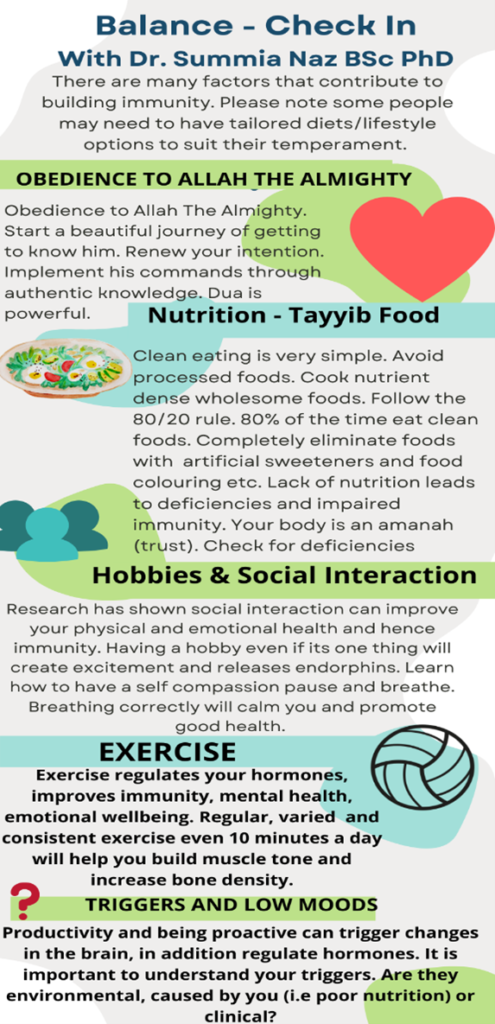
Each human is different, the temperament is different, and what your mind and body demand will be different at different stages in your life. For example, when you were younger, you may not have paid attention to nutrition. However, through the years, your body and mind were exposed to toxins and other types of stress and now you can only eat healthier foods – your body rejects processed foods.
CLEANLINESS
Keeping your body and environment clean (tahaarah) is a part of faith and great emphasis is laid on keeping your teeth, skin, hair, home, clothing, and streets clean. For example, going to the bathroom, Muslims wash themselves with water, and don’t only use toilet paper. Research has shown that in the production of toilet paper, chemicals have been used, when used excessively it can harm the skin, cause fungal infections and discoloration of the skin. Physicians have further discovered bacteria from the toilet paper can reach up to the kidneys via the urinary tract and thus cause a UTI (urinary tract infection), (Hamid. L. A et al, pg 802, 2015).
Wudhu (Ablution)
Muslims perform ablution 5 times a day. Allah the Almighty praised His slaves who purify themselves. Those who make themselves clean and pure (i.e. who clean their private parts with dust and water from urine and stools, after answering the call of nature). Quran: Surah At Tawbah 9:108
Allah the Almighty says:
O you who believe! When you intend to offer salat (the prayer), wash your faces and your hands (forearms) up to the elbows, rub (by passing wet hands over) your heads, and wash your feet up to the ankles. [Quran: Surah Al-Ma’idah, 5:6]
Part of ablution requires rinsing the nose, rinsing removes excess mucous, dirt, pollen, allergens, and irritants. Many microorganisms can also enter through the nose, mouth, or be embedded under nails or on the skin and the ritual washing in particular the wudhu cleanses areas where microorganisms can enter. Ablution involves washing the hands, mouth, nose, arms, head, ears, and feet. Predominantly the parts of the body exposed, the mouth and nasal entry points can lead to exposure to microorganisms and entry to the gastrointestinal tract.
Using a Siwak/Miswak
Siwak is a twig made from the Salvadora Persica and is used to clean teeth. Poor oral hygiene can lead to tooth decay and systemic inflammation. The mouth contains 100s of different bacteria and dental plaque is composed of aerobic and anaerobic bacteria. Siwak benefits include: cleans the teeth, strengthens the gum, fights oral odor, helps prevent gum disease, aids digestion. Using the siwak is a sunnah and with the right intention, you can gain reward.
Maintenance
Maintaining one’s health is directly linked to your Iman. We cannot deny the profound effect Iman (faith) has on one’s health and preservation. There is no doubt that prayer preserves the health of the body and also preserves faith, bringing happiness for this life and the next. Standing up in prayer at night preserves health against acute ailments and energizes the body, heart, and soul profoundly. The Islamic commandment of fasting also preserves health and is a type of physical activity for the body and soul.
Heart health is not only limited to diet and exercise but is also related to misplaced love. We should love Allah the Almighty and the prophet Muhammed (peace be upon him) above everyone else in our life. When we live our life to please others, we must understand that no human will ever be completely pleased. We consume our time, thoughts, and energy in trying to achieve peace and contentment that is not possible when trying to please people. Hence, we must please Allah the Almighty which will solve many of our affairs and bring comfort to our heart and soul. We can safeguard our hearts by attaching importance to what Allah the Almighty commands according to the Quran and Sunnah. Loving what He the Almighty loves will naturally aid you to carry out actions and hold thoughts that are pleasing to Him. Your actions will lead to good, and your thoughts will be healthier.
Education
Education is key – without education and understanding, our knowledge is flawed. Educate yourself and then act upon that which you learn. Remember that change is a process and consistent small changes are preferred. Attaching hope in Allah the Almighty and working on your Iman will bring a physical and spiritual benefit. During low times, we are advocated to make dua, be proactive and the rest is Qadr Allah. For example, if your diet is poor and the food is pro-inflammatory, this will have a profound impact on your mental health and general health. You must make the effort to make changes and if you do it for the sake of pleasing Allah the Almighty, there is a benefit in this world and the hereafter, in shaa Allah.
Once you gain beneficial knowledge, do not procrastinate and take proactive steps forward consistently. Procrastination leads to increased frustration, anger, stress, low self-esteem, and guilt. If you increase your productivity and you are more proactive, this can lead to improved brain chemistry, improved mood, increase in confidence, and improved time management. In regards to mood, procrastinating long term can affect your general health.
Exercise
Among the key aspects of preserving health is exercise, and the benefits in relation to immunity have been reported in many medical journals. Regular, moderate exercise can improve anti-inflammatory signaling pathways. Inflammation is the body’s immune response to something harmful or that irritates it. Inflammation is linked to many conditions such as obesity, arthritis, eczema, psoriasis, liver disease, dementia, Alzheimer’s, osteoporosis, type 2 diabetes, and autoimmune conditions, etc… It may be noted that some conditions like obesity where pro-inflammatory foods are constantly consumed or you are continuously stressed where stress hormones are released, can lead to constant low-grade inflammation (Vos T et al, 2017).
Further scientific studies have shown reduced: white blood cell count, CRP, tumor necrosis factor-alpha, and other inflammatory biomarkers in adults with higher levels of physical activity and fitness (Shanely et al, 2013). Thus, moderate exercise according to your temperament can decrease oxidative stress by promoting antioxidant defenses (Wedell-Neergaard et al 2018).
Exercise also improves mental clarity, bone density, muscle strength, immunity, sleep, mood, heart strength, coordination, lowers blood pressure, and regulates hormones. However, through client cases, it has been demonstrated how much exercise each individual is suited to, and the duration may also differ. The duration will also differ during different stages of your life, for example when you are younger you may be able to do higher intensity or due to stress or clinical manifestations, the type of exercise you choose will be lower intensity.
Moderate physical activity immunizes the body against most ailments and mood changes. Providing the activity is done at the right time and under proper circumstances. Physical activity should be practiced after one has digested their food. Any organ used regularly in a type of physical activity will get stronger especially during enjoyable sports. Those who practice sports regularly will strengthen their body and those who nourish their memory will get stronger. Horse riding, archery, wrestling, and running/walking are sports for the whole body (Imam ibn Qayyim Al -Jauziyah, 2003).
It has been reported in medical journals and during medical studies that continuous over-exertion of physical exercise can cause adverse effects such as oxidative stress and muscle damage (Nieman and Mitmesser, 2017). The amount of exercise you engage in can vary from person to person. For example, Dr. Summia Naz BSc PhD case studies have shown that for those suffering from autoimmune conditions, high-impact exercises can lead to extreme fatigue, exhaustion, and stress. The intensity and duration can vary during different moments and paths in your life.
Immune system interactions with pathogens, the host microbiome, nutrition, exercise, mental stress, and many other extrinsic/intrinsic factors are considered as crucial modulators of the immunosenescence process. A cross-sectional study was conducted that compared immune function in highly conditioned and sedentary elderly men and women. The highly conditioned elderly women had significantly higher levels of NK cells and T-lymphocyte function and reduced illness rates compared with the sedentary elderly women. Another study compared immune function in elderly runners who had trained for about 17 years and 19 elderly controls and reported significantly higher T lymphocyte function in the elderly runners (Shinkai et al, 1995).
There are different types of exercise such as cardiovascular which includes running and sports where you run and jump etc. Other types include Pilates and strength training which is lower impact, strengthens, and conditions the body. You must take the initiative, accountability and understand that moderate exercise can boost immunity and promote good health.
Nutrition
Exercise, nutrition, and lifestyle also promote a healthy gut. The gastrointestinal tract is colonized by trillions of microorganisms that include a gene set 150 times larger than that of the human genome. One-third of the adult gut microbiota is similar between most individuals, but diversity is dependent on overall health. Gut bacteria and diversity is influenced by a variety of factors, including dietary, exercise habits, age, gender, genetics, ethnicity, antibiotics, health, and disease (Rizetto et al, 2018).
The foundation of immunity includes nutrition. Every cell in our body depends on adequate and correct nutrition. Nutrient-dense foods are key to adequate nutrition. The simplest way to ensure that you are consuming nutrient-dense foods and drinks is to cook at home. Many store-bought ready-meals have additional ingredients that can reduce key vitamins and minerals in your body. The body was created to build immunity naturally. The body has a unique ability to heal naturally. When we pump it with artificial toxins or expose our body to a high level of environmental toxins, it can alter immune pathways. Our bodies have a unique ability to protect themselves against harmful viruses and bacteria and prime themselves to fight infections and diseases through correct intake of vitamins and minerals, adequate sleep, exercise, reduced stress, lifestyle, diet, and mindset. Please note: supplements in tablet or liquid form are not the same as eating wholesome foods. Supplements in tablet form are at times not readily digested and absorbed, it can create toxicity in the body. Only supplement if you have a diagnosed deficiency or under a healthcare provider.
Removal
To maximize nutrient intake, you can moderately follow the 80/20 rule, where 80% of the time you eat healthy home-cooked meals. The remaining 20% should not be toxic foods with harmful coloring or artificial sweeteners so choose the remaining 20% wisely. Through case studies conducted by Dr. Naz, if you follow the list below you should see improved health (please note some foods are not suitable for certain temperaments or clinical conditions, seek advice. Also those who are highly stressed and eating healthy may find stress affecting their digestion):
Generally
- No processed food
- No fast food
- No chocolate (unless pure and refined-sugar free)
- No cake (unless it is home made using pure ingredients)
- No candy
- No E-numbers that are toxic
- No preservatives
- No artificial sweeteners
- No hormone-laden foods
- Limit gluten and dairy (remove if you have gut health problems, eczema, or psoriasis)
- Eliminating pro-inflammatory foods will increase immunity. Natural sweeteners like date syrup and organic honey are fine in moderation.
- Focus on home cooked meals since most food cooked outside is laden with preservatives etc.
- The key is to read the ingredients on everything.
- Examples of healthy wholesome foods include: red animal meat (rich in heme iron which is readily absorbed by the body), organic eggs (source of vitamin D and protein), butter, ghee, olive oil, nuts, fish, fruits, organic flaxseed, pumpkin seeds, avocado, garlic, ginger, vegetables, herbs, honey, rice, potato, sweet potato, coriander, parsley, lemon, oranges, grapefruits, mushrooms (high in vitamin D and protein), sardines (high in vitamin D), pasta (read the ingredients), lentils, chickpeas, peas, cucumber, tomatoes, onion, oats, soups, bone broth.
A diet containing antioxidant omega-3 fatty acids is associated with a reduced rate of telomere shortening, a lack of dietary antioxidants correlates with an increased rate of telomere attrition. The consumption of a diet rich in antioxidants such as vitamin E, vitamin C, and beta-carotene has been associated with longer telomeres and a lower risk of breast cancer.
Antioxidants can potentially protect telomeric DNA from oxidative damage caused by extrinsic and intrinsic DNA damaging agents.

Fruits and herbs contain a mixture of biologically active polyphenols and antioxidants. Polyphenols, in particular flavonoids, have attracted much attention owing to their bioactivity and related health benefits (Gulcin, 2020).
Eat to preserve telomere preservation, include antioxidants, fiber, healthy fats (derived from avocados, fish, and nuts) in our diet, wild-caught salmon, organic/wild-caught mackerel, organic flax in moderation, organic berries, citrus fruits, etc…
Processed foods
Processed diets that include: vegetable oils, fried food, fast food, toxic e-numbers, toxic preservatives, processed flour, genetically modified foods are low in nutritional value. Through the years we have seen a rise in metabolic syndromes such as obesity, fatty liver disease, diabetes, and cardiovascular diseases (Yogita et al, 2017).
A deficiency in essential nutrients such as zinc, iron, selenium, copper, vitamins A, C, E, B6, folic acid, can result in altered immune responses. Nutrients drive metabolic processes in every cell of the body and optimal cellular homeostasis is important for maintaining health and avoiding diseases caused by nutritional deficiencies. Nutrients and metabolites serve as building blocks for cellular structures.
Gut Brain Axis
The gut-brain axis is a two-way communication system and is connected through the largest nerve in the body. Communication between the gut and brain can occur via chemical messengers, hormones, neurotransmitters, and the endocrine system. Some hormones and neurotransmitters are made in the gut, therefore what happens in the gut can affect our brain and behavior and vice versa.
The brain is related to the gut, for example when you receive devastating news, some may experience stomach cramps or reflux. When highly stressed, serotonin levels (key neurotransmitter for regulating mood) can alter, and this can lead to impaired digestion which can decrease the bioavailability of nutrients in the body.
Your lifestyle, mental health, diet, and social environment can all affect the gut-brain axis.

Environmental toxins
Working on spiritual health and living life according to the Quran and Sunnah, good nutrition, moderate exercise, and maintaining a healthy home environment is important for children and adults. Environmental toxins such as mold, household sprays, pesticides polluted areas, etc can also lead to lowered immunity. However, a lifestyle that includes nutrition and a good Islamic disposition can counteract the effects of some environmental toxins where prevention is not always possible. So one should not be consumed with worrying about the future and if they will get sick etc. Work on prevention, take proactive measures, and the rest is the will of Allah the Almighty (Qadr Allah).
Stress
An important area of discussion in relation to immunity is stress. My client cases have shown if a client is eating healthy but stress is not managed, this can contribute to poor health and hence low immunity.
Some levels of stress are normal and can motivate you to complete deadlines and improve performance. Some people develop a higher tolerance level depending on which type of stress is involved. For example, if you have prioritized your work and you are now revising for an exam your stress levels will be high but well regulated. If you revise for an exam last minute and you failed to prioritize your work, you will feel overly stressed.
Acute stress levels can lead to clinical manifestations if we do not learn how to regulate our stress levels. For example, if someone is in an abusive relationship, it will be harder to regulate your environment and emotions.
Below is a diagram showing how stress can manifest into clinical manifestations.

Another diagram below allows you to visualise how different areas of the body are affected. Visualizing and feeling will allow us to make mindful changes.
Proactive Points to Boost Natural Immunity:
- Reduce and manage stress. How? Through dua, authentic duas, deep breathing, walking, getting help (maid or family). It will be imperative to discuss what concerns you have and understand your clinical manifestation.
- Incorporate exercise into your daily life. Even if it is only 10 minutes. Exercise is essential, to digest and metabolise your food correctly, in order to gain maximum nutrient absorption, exercise is crucial. If you eat healthy but your body is not digesting the food adequately, this can cause issues.
- Find something you love. Something you used to enjoy, a hobby.
- Incorporate Quran in your life with your kids. Learn tajweed.
- Hijama with a licensed practitioner followed by a careful diet for 1 week. Hijama has many benefits; it is a sunnah, promotes energy flow in the blood, blood detoxification, promotes blood circulation, increases immunity and helps reduce pain.
- Seek help through therapy such as life coaching, health coaching and counselling. Therapy with nutrient support will also help lift your mood.
- Mindfulness, self-regulation, and emotional intelligence.
Finally, I leave you with some important information that will practically help you with immunity. As mentioned earlier, it is a vast topic and cannot be encompassed in this article. I have tried to condense as much information as possible.
Emotional Intelligence
Emotional intelligence which incorporates self-regulation and self-awareness can contribute to immunity in addition to mindfulness.
Below is a simple exercise to encourage mindfulness. As you can see this simple technique will not only calm you, but it will also help you to be more mindful of the blessings of Allah the Almighty. By conducting this technique, we are increasing our mindfulness of Allah the Almighty. We should strive to be mindful in everything we do and what better way to start than praising Allah the Almighty for our bodily functions.

Practicing mindfulness will also create positive psychology and you will increase in gratitude towards Allah the Almighty. Gratitude and gratefulness will improve your mood, release neurotransmitters, contribute to improved immunity, improve your connection with Allah the Almighty.
Allah the Almighty says:
“Therefore, remember Me (by praying, glorifying, etc…). I will remember you, and be grateful to me (for my countless favours on you) and never be ungrateful to Me.”
Mindfulness, gratitude, and emotional intelligence can help you decrease the stress response in your body. Emotional intelligence is more important than IQ. In a society that is fast-paced, we have no time to stop and deconstruct what is happening physically and emotionally. I encourage my clients to stop and restart from the beginning, by practising mindfulness (appreciating the beautiful body Allah the Almighty has given them).
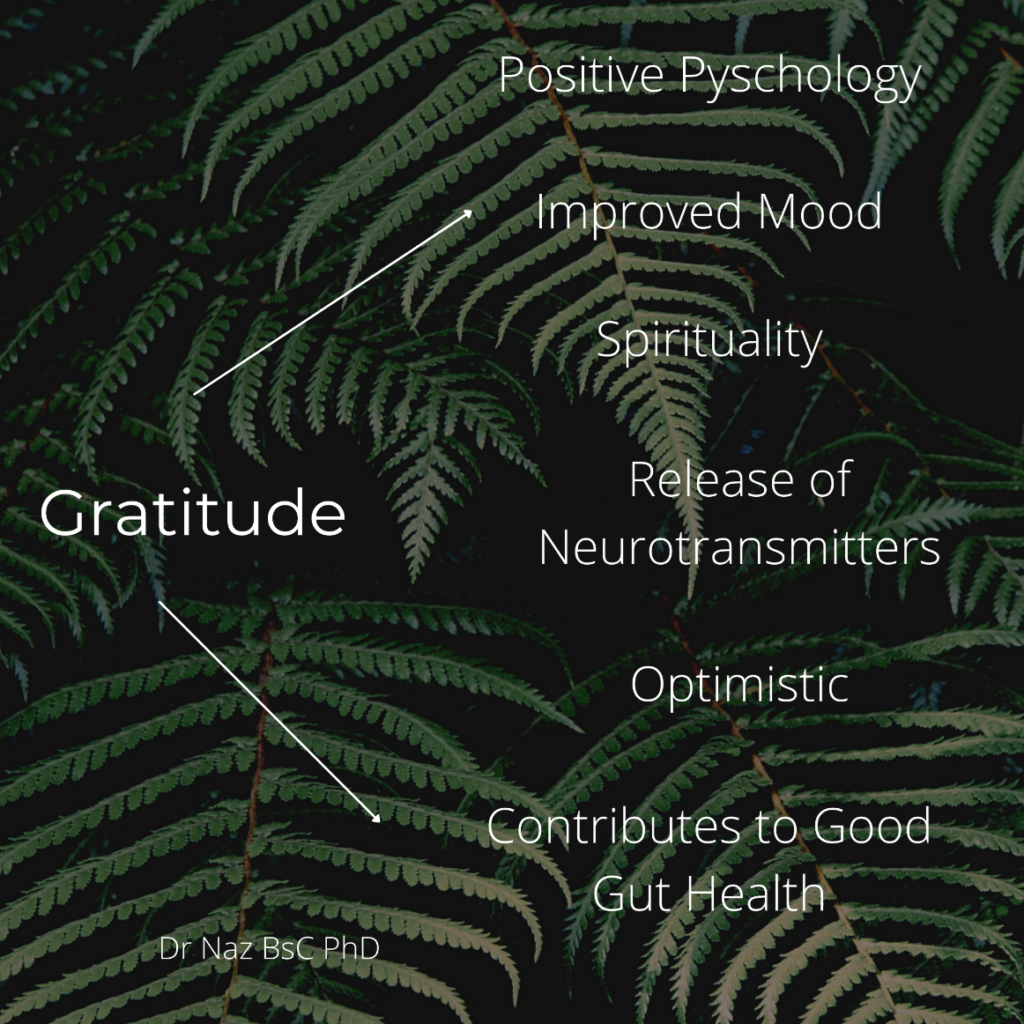
For example, when you eat you can practice mindful eating and savor each mouthful. You can mindfully wake up in the morning, read your adhkar (glorify Allah the Almighty) for all He has given, and with each morning action, value your sight and touch.
Brain Plasticity
With mindfulness comes gratitude, emotional intelligence requires one to be more self-aware. Self-awareness allows you to recognise how your emotions and actions affect you and others around you. Self-regulation is actions and decisions you take to regulate your emotions. If you learn how to self-regulate, you will proactively make changes, and this will change your brain chemistry too. New experiences, positive thoughts, proactive actions, and productivity can change the activity in your brain. The brain can modify its connections by creating new neural pathways. For a real change, there must be education, action and we must do it with the right intention, for the sake of Allah the Almighty.

How you talk to yourself can also have an impact on immunity. Try re-wording how you speak to yourself. This is something athletes use to achieve their personal best. In addition, those who are emotionally resilient will reframe and reword to motivate and encourage a positive outcome.
It is not befitting of a believer to lose hope. We should rather use our intellect and try to achieve excellence. Perfection does not exist, only Allah the Almighty is Perfect. Positivity and hope release neurotransmitters and can contribute to good mental and physical health. I pray Allah the Almighty guides us all to what pleases Him, Ameen.

Finally, let me present you with some case studies from client cases from my Integrative Therapy Program.
Case 1
2 women who were pregnant came to me at the same time, both had covid, both wanted to improve their health and wellbeing. Both were put on a Novel Integrative Therapy Program. To improve immunity and improve wellbeing both required a different approach based on their case. One required a deeper look into clinical manifestations rooted in childhood where potential intolerances were undiagnosed from a young age. An elimination but nutrient-dense diet was given and observing the client’s daily eating habits and lifestyle were key to unfolding what the body was reacting to. After a month the client could breathe better, increased in energy and there was no reflux on days the plan was followed. The most beautiful part of this story was that in the final trimester of pregnancy most women decrease in energy, or the reflux gets worse. This client’s energy levels were higher, her reflux wasn’t there on days she observed the tailored diet, in addition, she went back to work, alhamdulillah.
The second client required lifestyle support and support in understanding many events in her life, many lifestyle changes were introduced. Although she presented the same concerns her clinical manifestations were not primarily related to nutrition. Healing naturally requires a deeper understanding and deconstructing past events to ease past trauma is key to healing in some cases. Holding in emotions can lead to increased inflammation, pain, fatigue, anger, and many other symptoms due to a change in stress hormones released. We worked through past events and partly nutrition in addition to relaxation and mindfulness techniques. The client’s health improved significantly. When she started her program, she was on the verge of being admitted to the hospital, however decided to commit to the program (an informed decision) and during the program, her health improved significantly.
Case 2
A client was concerned about random hives appearing on her skin and poor gut health. She wanted to work on a healthy lifestyle. Early in the program, it was understood the client did not require nutritional support. Her diet was balanced and healthy. However, her mental health was suffering as a result of family-related stress. As an Integrative Therapy Coach, I not only work with the client I also work with the client’s family if required. After coaching and family therapy within a few weeks, the client’s symptoms started to reduce and within a month were completely gone. Soon after she got married and Alhamdulillah had a healthy baby. A few years later, her symptoms returned slightly but she understood how to manage them through skills she learned on the program and returned to normal.
Case 3
A client had multiple concerns: anxiety, palpitations, sinus congestion, headaches, sadness, body pain, demotivation, memory impairment, panic, worthlessness, anger, irritability, poor sleep, feelings of guilt, weight gain, hard to focus. A personalised integrative therapy program was put together for the client. The program included: nutritional advice, personal development support, self-care support, self-regulation support, identifying triggers, family therapy, life coaching, health coaching, and counselling. All her initial symptoms either reduced significantly or were completely gone. She is now running two successful businesses, Alhamdulilah.
References
Chandra. R.K, 1997, Nutrition and the Immune system, The American Journal of Clinical Nutrition, 66, 460S-463S.
Gulcin. I, Antioxidants and antioxidant methods: an updated overview, Archives of Toxicology, 2020, 94, 651-715.
Hamid. L. A, Toyong. N. M. P, Rahman. A. A, Hygiene Practice and the Adaptation of the Modern Muslim, Social and Behavioral Sciences, 2016, 222, 800-806.
Imam ibn Qayyim Al -Jauziyah, J.A. Rub, AR. Abdullah, Healing with Medicine of the prophet (peace be upon him), second Edition 2003.
Nieman. D.C, Mitmesser. S.H, Potential impact of nutrition on immune system recovery from heavy exertion: a metabolomics perspective. Nutrients 2017.
Rizetto. L, Fava. F, Tuohy. KM, Selmi. C, Connecting the immune system, systemic chronic inflammation, and the gut microbiome. J Autoimmun 2018, 92, 12–34.
Shanely, R.A, Nieman. D.C, Henson. D.A, Jin. F, Knab. A.M, Shaw. W, Inflammation, and oxidative stress are lower in physically fit and active adults. Scand J Med Sci Sports 2013, 23, 215–23.
Shinkai. S, Kohno. H, Kimura. K, Komura. T, Asai. H, Inai. R, et al. Physical Activity and immune senescence in men. Med Sci Sports Exerc 1995, 27, 1516–26.
Vos.T, Abajobir. A. A. Abate. K. H, Global Burden of Disease Study, The Lancet, 2017, Vol 390.
Wedell-Neergaard. A.S, Krogh-Madsen. R, Petersen. G.L, Hansen. A.M, Pedersen. B.K, Lund. R, et al. Cardiorespiratory fitness and the metabolic syndrome: roles of inflammation and abdominal obesity. PLoS One 2018, 13.
Yogita. R, Pothineni. N.V, Kovelamudi. S, Metabolic Syndrome: pathophysiology, management, and modulation by natural compounds, Therapeutic Advances in Cardiovascular Disease, 2017.

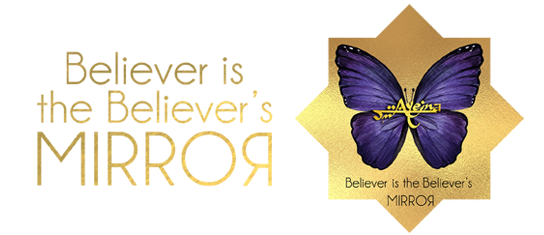


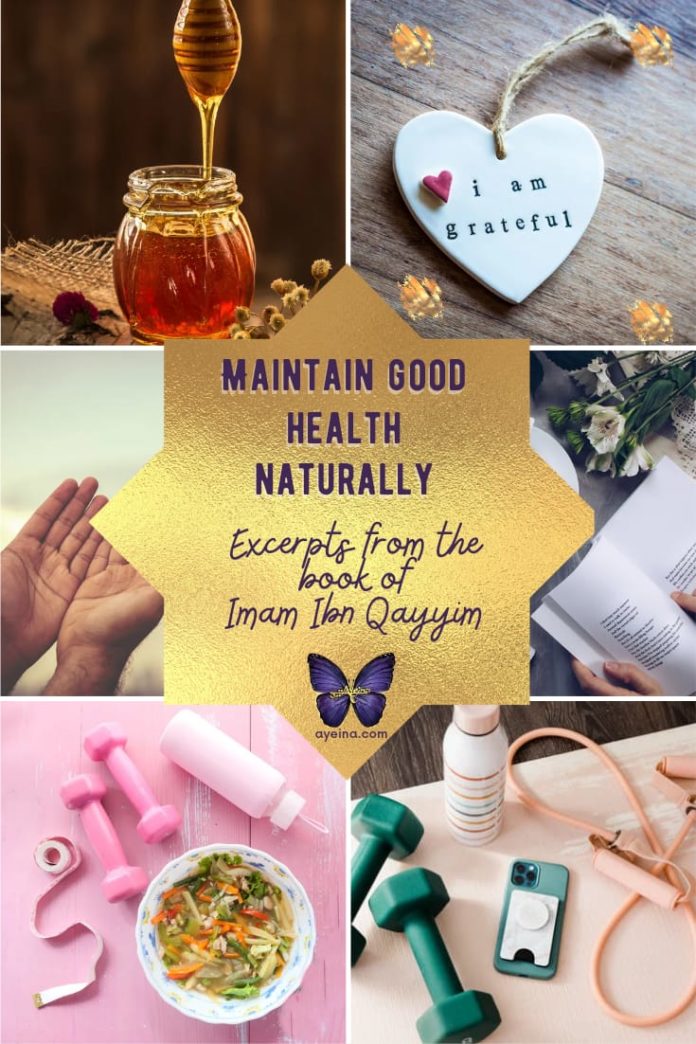

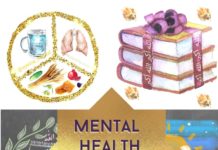
Thank you so much, jazakumullahu khair. It’s really a beneficial and an enlightening write-up.